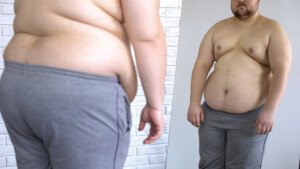
The war rages whether or not obesity is selfish.
It’s like, “How can that mother allow herself to get that way? Her young kids will lose their mother early in life.” Have you heard it put that way before?
Do you think obesity is selfish?
Is it as fair to call a person selfish for allowing himself or herself to get obese, as it is to call someone selfish who smokes or does drugs — especially when they’re still raising their kids?
In the world of medical science, there are many facts and there are many theories. I’m going to mention some facts.
A parent owes his or her kids their best effort at being healthy and fit.
This means that if a parent is thin but smokes, I feel the same way. If a parent is thin but never exercises, I feel the same way.
In fact I recently saw a young couple; mom was pushing a baby in a stroller.
She was “skinny fat.” No tone in her spindly arms, a slouched posture, mushy middle, slumped shoulders; she looked like a brisk walk up a hill would pummel her.
The man with her, presumably the baby’s father, was a little overweight, nothing notable, but…no muscle tone, and he was smoking.
It was obvious by their physiques that neither worked out.
How could they be so neglectful when that baby needed them for many years to come?
So I’m not picking on obese people; but I’ve decided to focus this article on the oversized because obesity is one of America’s unhealthy epidemics.

Shutterstock/Motortion Films
If I see a thin mother in a pantsuit, I can’t necessarily tell she never exercises. But if she’s very large, I can clearly see she’s obese.
Maybe she exercises; maybe she doesn’t. But obesity is a health hazard, whether that person exercises or not. Obesity is what it is: excess fat. And excess fat is harmful: a medical fact.
Is it selfish for a thin, nonsmoking, exercise-enthusiast to be a careless driver? Yes, indeed!
But I can’t tell if that buff woman who can bench press 185 pounds is a reckless driver.
So when I see her, I don’t think, “She’s selfish.” But if I see an obese woman with a few young children in tow…I just can’t help think certain things.
I see overweight people at the gym and some work out hard.
The ones who work out hard have visible muscle tone and I can easily imagine them having no problem being on their feet all day in the hot sun with their children at an amusement park without suffering heat exhaustion or painful legs.
But there are obese parents of young kids who simply do not exercise, and their bodies look strikingly different than the bodies of their same-weight counterparts who work out hard at the gym.

Shutterstock/Inger Anne Hulbækdal
If obesity, by and large, is created by medical conditions, then where were these medical conditions 100 years ago, when obesity in the population was substantially less, percentage-wise, than it is today?
If genetic factors drive obesity, then obesity would be a uniformly global problem in First World countries. It isn’t. Far from it.
Why is it that I’ve helped my very overweight clients lose fat that they couldn’t before they hired me, by teaching them different ways to exercise?
This has nothing to do with “fat genes.”
There are many weight loss success stories out there:
Obese individuals who admit to having unhealthy eating habits (including overeating) and no exercise habits, who then go on to lose substantial amounts of weight after cracking down on their poor eating habits and implementing an exercise program.
In America, it’s super-easy to supersize meals and get fat.
Everywhere you turn, there’s high-calorie, delicious food. This is the formula for an obesity epidemic.

This epidemic, completely non-existent a few generations ago, does not occur this quickly if it is caused by a rampant “obesity gene” in the gene pool.
The percentage of obese people at a gym, recreational center or health club, at any given time, is remarkably smaller than the percentage of such individuals in the general population.
One may assume that this is because most very overweight people prefer to exercise at home, but this isn’t the case.
The vast majority of plus-sized people at gyms exercise differently than smaller folks (there are exceptions), and the way one exercises makes a difference when it comes to body weight; trust me on that.
Just because you don’t need a degree to exercise doesn’t mean that there isn’t a learning process involved.
Obese people make mistakes in the gym that prevent weight loss, such as focusing on small muscle groups with light resistance, rather than large muscle groups with multi-joint routines involving heavy weights. (e.g., too much time with the triceps kickbacks and crunches, and a total absence of weighted squats and deadlifts).
And by the way, I was cigarette-shaming that man with the baby more than I was body-shaming him.


































